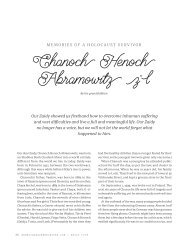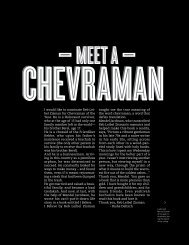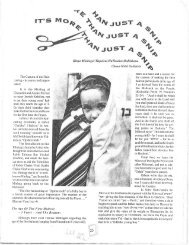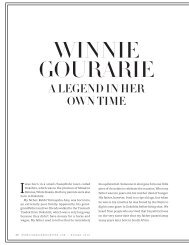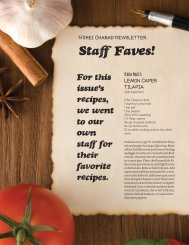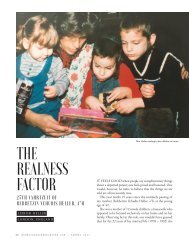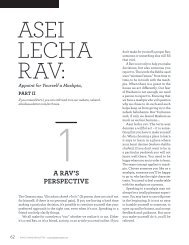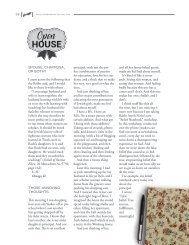Create successful ePaper yourself
Turn your PDF publications into a flip-book with our unique Google optimized e-Paper software.
definition of, and fervent wish to<br />
avoid, kitniyos. Some definitions are<br />
quite extreme. There is a machlokes<br />
as to whether coffee and cocoa are<br />
kitniyos. The Pri Megadim mentions<br />
those who had a minhag not to<br />
eat potatoes and the Chayei Adam<br />
actually forbade potatoes, categorizing<br />
them as kitniyos. However, Klal<br />
Yisroel has long settled this issue<br />
in favor of potatoes. A modern-day<br />
machlokes over cottonseed exists,<br />
but most authorities rule that there<br />
is no question of kitniyos in cottonseed<br />
oil. Some people became so<br />
extreme that if a vegetable or fruit<br />
contains many seeds, they removed<br />
it from their Pesach shopping list.<br />
However, the halachic definition of<br />
kitniyos (in the Alter Rebbe’s Shulchan<br />
Aruch) does not rule out any<br />
of the above foods.<br />
Nonetheless, there happens<br />
to be some truth to the joke. The<br />
Belzer Rebbe, Reb Aron, wouldn’t<br />
eat cucumbers on Pesach because<br />
his ancestors didn’t eat them. He<br />
explained that since even a minute<br />
amount of chometz is forbidden,<br />
we need extra siyata d’Shmaya.<br />
“Whereas for the potatoes my ancestors<br />
already davened, this needs new<br />
tefillos; thus, I’d rather go on the<br />
paved road.” However, the Belzer<br />
Rebbe also didn’t fly on airplanes<br />
for the same reason…<br />
The Tzemach Tzedek said not<br />
to eat radishes on Pesach, without<br />
giving a reason. There is an<br />
ancient minhag not to eat garlic<br />
on Pesach; the Pri Megadim writes<br />
that he does not know the reason for<br />
it. In his Shulchan Aruch, the Alter<br />
Rebbe brings a case where garlic is<br />
used on Pesach, and from the context<br />
we can perhaps infer that the<br />
Alter Rebbe had no problem with<br />
its use. Some have testified that in<br />
the city of Lubavitch garlic was used<br />
on Pesach. Nevertheless, there are<br />
many Lubavitchers who do not use<br />
garlic on Pesach.<br />
IF FOOD IS DROPPED ON THE<br />
FLOOR, MAY IT BE WASHED AND<br />
USED? WHEN MY BEST FOUR<br />
PEELERS FALL ON THE FLOOR,<br />
DO I REALLY NEED TO WAIT UNTIL<br />
NEXT YEAR TO USE THEM AGAIN?<br />
A common but not official Chabad<br />
minhag (practiced by many others<br />
as well) is not to use any food that<br />
touches the floor. The same applies<br />
to utensils as well. If necessary, one<br />
may wash and immediately use a<br />
utensil that fell on the floor. This<br />
does not present a halachic problem.<br />
However, common custom is<br />
to put away the utensils until the<br />
following year. While this custom<br />
is not mentioned outright in halachah,<br />
some narrow support can<br />
be found in respected Halachic<br />
sources, and it’s very similar to<br />
the minhag of peeling vegetables<br />
and fruits.<br />
WHAT IS THE HALACHAH IF I<br />
MARRY A MAN WITH FEWER<br />
CHUMROS THAN I WAS RAISED<br />
WITH? DO I HAVE TO KEEP MY<br />
CHUMROS FROM MY PARENTS’<br />
HOUSE, OR CAN I DROP THEM?<br />
WHAT IF I MARRY SOMEONE<br />
WITH MORE CHUMROS, AND HE<br />
DOESN’T WANT TO MOVE IN TO<br />
MY PARENTS’ HOUSE FOR YOM<br />
TOV BECAUSE THAT WOULD<br />
MEAN DROPPING HIS CHUMROS?<br />
Virtually all poskim agree that the<br />
woman follows her husband’s chumros<br />
after the wedding, whether they<br />
are more lenient or more strict than<br />
the way she was raised. If the husband<br />
is less strict than the wife’s<br />
family, the wife is permitted to<br />
keep the chumros from her parents’<br />
home if her husband does not<br />
mind. If there is any conflict, one<br />
should get advice from an experienced<br />
Rav or mashpia. Regarding<br />
chumros, the effect on sholom bayis<br />
must be taken into consideration. A<br />
family can fall apart chas v’sholom<br />
because of a couple’s lack of respect<br />
and appreciation for each other, not<br />
because of religious differences.<br />
However, it should be pointed<br />
out that this is being written for<br />
a women’s magazine. Any man<br />
reading this should think carefully<br />
and consult with a mashpia or Rav<br />
before insisting that his wife add<br />
chumros that he was raised with.<br />
1) Is it a real minhag with a sound<br />
basis? 2) Is it going to make his<br />
wife “call out to Hashem because<br />
of the work”? 3) Is he presenting<br />
it to her as a suggestion with room<br />
for her input, i.e. not “I insist,” but<br />
rather, “This is really important for<br />
me, I hope it won’t be too difficult<br />
for you”? 4) Is he sure that he is as<br />
strict and demanding on himself<br />
as he is on his wife?<br />
Some people have a family hiddur<br />
not to use dish soap on Pesach,<br />
only salt water mixed with lemon<br />
juice. A husband who wishes to<br />
incorporate this hiddur might consider<br />
offering to wash the dishes<br />
and pots himself.<br />
DO I NEED TO BUY BRAND NEW<br />
SIDDURIM EVERY YEAR FOR<br />
<strong>PESACH</strong>?<br />
There is no need to buy new siddurim<br />
each year for Pesach, so long<br />
as last year’s Pesach siddurim were<br />
stored away from the chometz. You<br />
may also use siddurim that were<br />
APRIL 2014<br />
85




